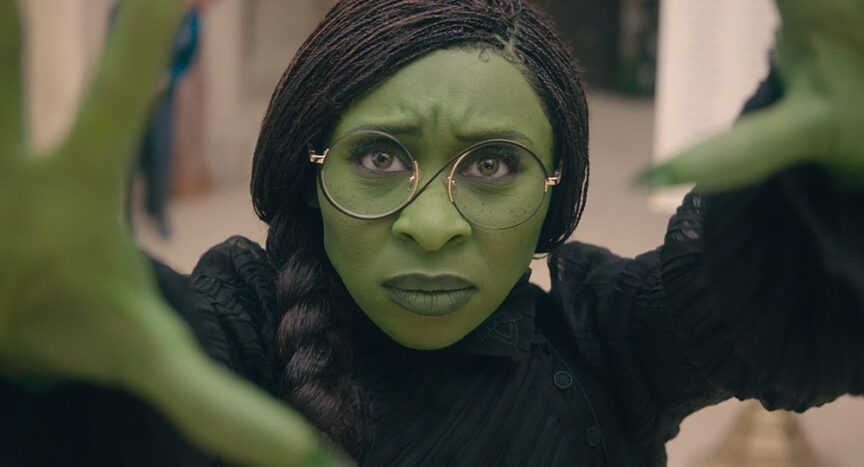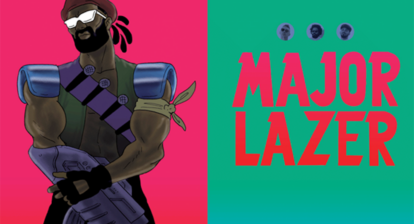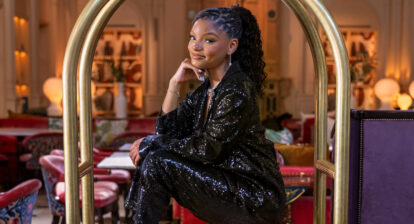The idea of being “othered” is explored in many ways throughout the new movie Wicked. In this stirring adaptation of the Broadway musical, Elphaba is mocked, rejected and condemned for existing naturally outside of the mold society would like her to operate in.
One of the strongest arguments arising from the story, no matter the iteration, lies with its protagonist, Elphaba. Brilliantly played by EBONY Power 100 Pathbreaker of the Year honoree Cynthia Erivo, this 2024 version of the “wicked witch” and her journey to self-actualization has numerous connections to Black women that have never been more compelling and powerful. Watching Wicked as a Black woman felt like a warm hug, and as its new world unfolded in front of my eyes, I felt embraced by a character who saw and understood me.
The experience of being a Black woman can be frustrating and contradictory, as we are often overlooked and ostracized in politics, media, sports and the workplace, yet are often expected to be both savior and fixer. Like Black women, Elphaba finds herself at the center of criticism and abuse due to the color of her skin yet exploited for the talents she possesses.
Through another lens, the story of Wicked emphasizes how isolating and alienating it can feel to be the only one standing alone in the face of injustice, corruption and oppression. When Elphaba pushes back against powerful forces, it is not only her protest that puts a target on her back but the complacency of the rest of her peers that allows her to be a scapegoat.
From Harriet Tubman to Shirley Chisolm, we have seen this story play out for centuries as Black women continue to be “othered” in the spaces they have a right to occupy. Not only have Black women experienced this racism, misogyny and exclusion for generations, but we continue to see it replayed back at us through a lens that is harmful and detrimental.
With the introduction of Hollywood and film aligning with the birth of 1880s Jim Crow, Black women have been assigned stereotypes and targeted with tropes meant to discourage and threaten from ever stepping outside of the “line” society drew—and now, with social media, it can be rare in this day and age to look into a screen and be somewhat satisfied with the narrative society reflects at you.
Performing as Harriet Tubman, Aretha Franklin and Celie in The Color Purple, Erivo is no stranger to navigating the nuances of Black woman stories and the themes that resonate in them. She taps into their power and showcases how they defied society’s lack of belief in their capabilities and flew to greater heights.
Erivo’s Elphaba is daring and powerful; her presence commands the screen, captivating audiences from start to finish. As Elphaba realizes her full potential, a message is communicated to Black girls all over the world that they, too, can wield their own “Black Girl Magic.” It shows us that the greatest danger is not those who oppose us but those who fail to understand and embrace the power we hold within.
The true pinnacle of her performance is the thoughtful, gentle and passionate moments the audience gets with her character. A scene at a dance is one of the most beautiful in the film, as it enshrines Elphaba in an illuminating light, and she is allowed to take up space. This intimate moment highlights the sensitivity and vulnerability that is present in the experience of being a Black woman. It was like the protagonist was reaching out to us, using her movements to tell a story and connect us to one another.
Having an Elphaba played by a Black woman offers touching anecdotes that provide comfort and empowerment. Although she is a fictional green character, Erivo’s performance humanizes Black women and reserves dignity in ways that are healing and heartwarming.
Wicked is not just for me in the present; it heals my inner child who knows all too well what it is like to be told to suppress my natural talent, curiosity and confidence to fit into a predetermined template society has designed. This itineration of Elphaba encourages an unlearning of racist falsehoods we are supposed to believe as truths and embrace the holistic beauty of being a Black woman.
This film was much anticipated, and now, it’s a much-needed reminder to release the constraints that hold you and explore the freedom that comes with being your truest self.
As I watched Elphaba fearlessly leap through that glass window, the film reminded me of the many Black women who have had to and continue to break through glass ceilings, creating a seat at the table for those who dare to defy gravity. Like these women and Elphaba, I am encouraged to dare, take the leap and see what happens when I fly free.
Makayla Gathers is a junior at Harvard University from Charlotte, North Carolina. At Harvard, she studies both Government and African American Studies and is a pre-law student. She currently chairs the Community Action Committee at the Harvard Kennedy School Institute of Politics and is a staff writer for The Harvard Crimson.



